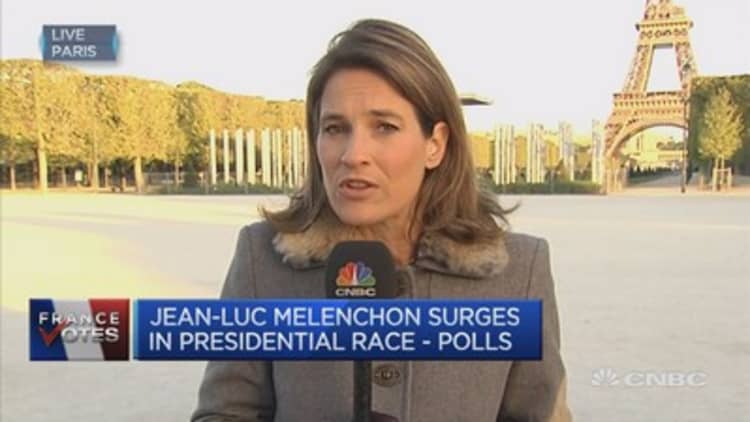Despite blowing out this week to levels rarely seen since the euro zone sovereign debt crisis of 2012, the yield gap between French and German government debt could widen still further in coming weeks, according to analysts.
"In spite of being close to the widest levels seen since 2012, the two-year and 10-year France-Germany spreads are pricing in a low probability of a Le Pen victory, in my view. I think the probability being reflected in this spread is too low compared to the tighter first round result that polls suggest," Antoine Bouvet, rates strategist at Mizuho International, told CNBC via email on Thursday.
The spread - used as a "fear gauge" by investors ahead of the French elections - has closely tracked political developments in recent months, narrowing as the risk of a victory for a candidate perceived to be 'market-unfriendly' is viewed to have ebbed and vice versa. Specifically, after several months of spreads sitting at elevated levels versus historical norms, the yield differential shrank alongside the swelling of momentum for centrist candidate Emmanuel Macron during February and then rose once again following last week's surge by far-left newcomer rival Jean-Luc Mélenchon after a notable performance by the latter in two recent televised debates.
Indeed, an average of the latest opinion polls from five closely watched providers (as compiled by Berenberg) demonstrates a tightening of the four-horse field with Mélenchon rising to just over 18 percent in opinion polls, trailing marginally behind scandal-hit Republican candidate François Fillon on 18.8 percent and only a handful of points short of Macron on 23.1 percent and Le Pen on 23.5 percent.
"For France, Europe and markets, a run-off between Mélenchon and ultra-right Marine Le Pen on 7 May would be a choice between bad and ugly," according to Holger Schmieding, chief economist at Berenberg, in a note to clients on Thursday, who attributes a 10 percent likelihood each to the odds of either Le Pen or Mélenchon becoming the next French president.

Similarly, Mizuho's Bouvet does not anticipate Le Pen to triumph, however, he does expect momentum to carry her through into the next round and identifies the realization of that reality as the point at which markets will display a more pronounced acknowledgement of the risks of victory for a non-centrist candidate.
"I do not expect a Le Pen victory but in the event of Le Pen being in the second round (the most likely scenario), I think some investors will hedge more actively their French risk," posited the strategist.
"The amount of hedging will depend on who is in the second round against Le Pen. In any case, I expect some widening after the result of the first round is known," Bouvet added.
As of Thursday lunchtime, the spread differential on two-year French and German debt was hovering around around 41 basis points while the equivalent gap for 10-year bonds sat at 71 basis points. To put this into context, between 2013 and 2016, the average yield gap on two-year debt amounted to less than 10 basis points, according to Deutsche Bank, while until late last year, the spread differential on 10-year debt had not risen above 60 basis points since the first quarter of 2014.
While other factors naturally also contribute to shaping the trajectory of the two curves – including the higher propensity for German assets to be in demand as geopolitical risks rise (as has been seen this week), economic data releases and the relatively liquidity of both countries' government securities, for example - the measure is nonetheless seen as a good proxy to track and gauge election sentiment.
The apparent sanguinity of markets as reflected by current asset prices was also acknowledged by Craig Nicol, credit analyst at Deutsche Bank, in a note to clients on Thursday.
"French assets have remained relatively resilient all things considered but should the momentum in the polls continue over the next week then it wouldn't take much for this story to become the dominant focus for the market again" said Nicol.


